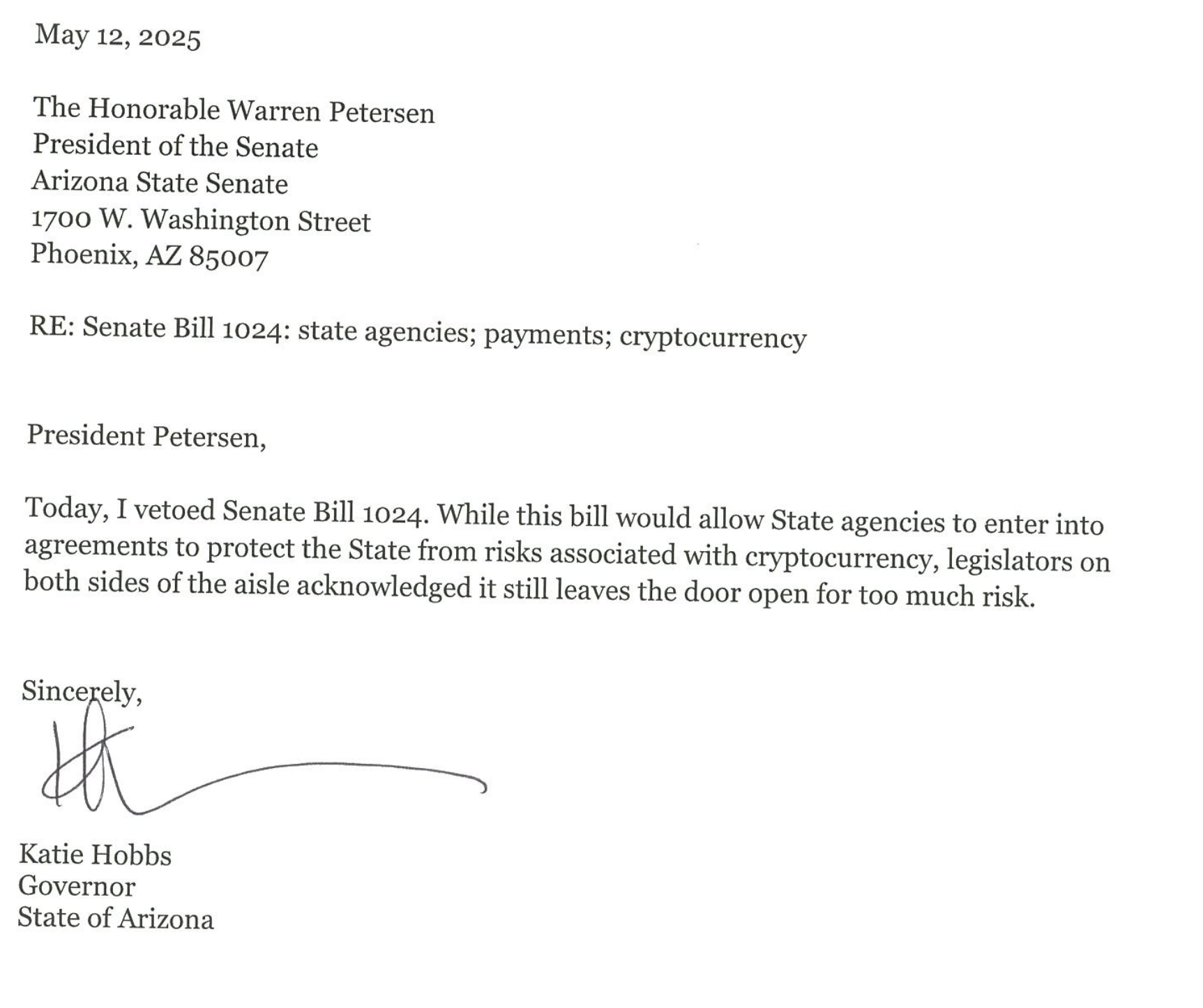
Arizona Governor Takes Cautious Stance on Crypto
Arizona Governor Katie Hobbs has taken a measured approach to cryptocurrency, recently vetoing two bills aimed at expanding the state’s involvement in digital assets while simultaneously signing a bill tightening regulations on Bitcoin ATMs. This move highlights the evolving landscape of crypto regulation, with states adopting varying degrees of engagement and oversight.
Vetoes on Crypto Reserve and Payments
Hobbs rejected two bills that would have allowed Arizona to hold crypto assets through a dedicated state fund and accept crypto payments for government services. The first, Senate Bill 1373, aimed to establish a Digital Assets Strategic Reserve Fund, which would have allowed Arizona to hold crypto seized from criminals or allocated through legislation. Hobbs expressed concerns over the volatility of the crypto market, arguing that it’s not a suitable investment for public funds. She pointed out that Arizona already has legislation allowing the state to utilize cryptocurrency without exposing general funds to risk.
She previously vetoed Senate Bill 1025, the more ambitious “Arizona Strategic Bitcoin Reserve Act,” in early May. This bill would have authorized up to 10% of Arizona‘s treasury and retirement funds to be invested in Bitcoin and other digital assets. While the bill received backing from some lawmakers, Hobbs ultimately deemed it too risky. This decision reflects the broader debate among policymakers concerning the wisdom of using public funds for crypto investments, given the inherent volatility and potential for losses.
Hobbs also vetoed Senate Bill 1024, which would have enabled state agencies to accept cryptocurrency payments for taxes, fees, and fines through approved service providers. While the bill sought to shield the state from direct exposure to price fluctuations, Hobbs considered it too risky. This decision aligns with the cautious approach many state governments take towards crypto payments, fearing potential liability and logistical challenges.

New Regulations for Bitcoin ATMs
Despite her stance on the two crypto bills, Hobbs has not entirely closed the door on digital assets. She approved House Bill 2387, which introduces new consumer protection rules for Bitcoin ATM operators in Arizona. The bill aims to enhance transparency and reduce fraud, protecting consumers from scams that are prevalent in the crypto space.
The bill mandates that Bitcoin ATMs display clear, multilingual warnings about common scams and require users to acknowledge these risks before proceeding with transactions. Operators must also provide detailed receipts with transaction data, contact information, fees, and refund policies. The bill further imposes limits on transaction amounts for new and returning users, requiring operators to offer 24/7 customer service.
This regulatory approach echoes a growing trend among state and federal authorities to address the potential risks associated with Bitcoin ATMs, including fraud, money laundering, and consumer protection. Arizona‘s new regulations join similar measures adopted in other states, demonstrating the increased focus on oversight in this emerging industry.
Mixed Signals and Future Implications
Governor Hobbs‘ actions present a mixed message on Arizona‘s stance towards cryptocurrency. While she expresses concerns about the volatility and risk associated with crypto, she also acknowledges the potential of digital assets and takes steps to protect consumers within this space. Her decision to approve legislation updating the state’s unclaimed property laws to include digital assets suggests a more open attitude towards the long-term integration of crypto into the state’s legal framework.
The future of crypto regulation in Arizona, and the US as a whole, will likely depend on the evolution of the crypto market and the perceived risks and benefits of this nascent technology. Policymakers will need to strike a balance between encouraging innovation and protecting consumers, navigating a rapidly changing landscape.


